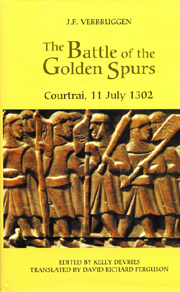 The Battle of the Golden Spurs (Courtrai, 11 July 1302)
The Battle of the Golden Spurs (Courtrai, 11 July 1302) Book contents
- Frontmatter
- Contents
- List of Illustrations
- General Editor's Preface
- Editor's Introduction to the 2002 edition
- Foreword to the 1952 edition
- Acknowledgements (to the 1952 edition)
- Preface: ‘An almost impossible event …’
- Introduction
- Part One Historiography and the Study of the Sources
- 1 A Problem for Historical Methodology
- 2 The Sources
- Part Two Historical Overview of the 1302 Campaign
- General Conclusion
- Bibliography
- Index
2 - The Sources
from Part One - Historiography and the Study of the Sources
Published online by Cambridge University Press: 12 September 2012
- Frontmatter
- Contents
- List of Illustrations
- General Editor's Preface
- Editor's Introduction to the 2002 edition
- Foreword to the 1952 edition
- Acknowledgements (to the 1952 edition)
- Preface: ‘An almost impossible event …’
- Introduction
- Part One Historiography and the Study of the Sources
- 1 A Problem for Historical Methodology
- 2 The Sources
- Part Two Historical Overview of the 1302 Campaign
- General Conclusion
- Bibliography
- Index
Summary
The Emergence of Flemish and French Versions
The glorious Flemish victory beneath the walls of Courtrai did not bring an end to the war. It was clearly evident that the most powerful prince in the West would make an immediate attempt to wipe away the shame brought by the defeat. The Flemings understood that their defence had to be organised quickly. All considered, the victors of 11 July 1302 represented only half of the county, these being Bruges and the Bruges Franc, the coastal areas, the areas around Courtrai and Aalst. Ghent was still in the hands of Flemish followers of the King; only a few hundred of those who had been banished from the town, and had fled, took part in the battle. Ypres only sent a moderate contingent. Lille, Douai and all of those lands that later formed French Flanders were still occupied by royal troops. Would the inhabitants of such towns, and the surrounding countryside, accept the possibility of successfully resisting the powerful King of France? In order to convince them, the rebels acted very skilfully. After the merry news of the victory had driven out the patricians at Ghent and made powerless those Flemish favourable to the King, an armed delegation entered the town triumphantly. Never had such a celebration been seen before. No man worked that day. The victors had brought their armour and weapons with them: the blood-stained, damaged armour and split shields all proved how violently battle had been waged and how the townsmen had risked their lives against the Flemish supporters of the King and their French allies.
- Type
- Chapter
- Information
- The Battle of the Golden Spurs (Courtrai, 11 July 1302)A Contribution to the History of Flanders' War of Liberation, 1297–1305, pp. 40 - 124Publisher: Boydell & BrewerPrint publication year: 2001
